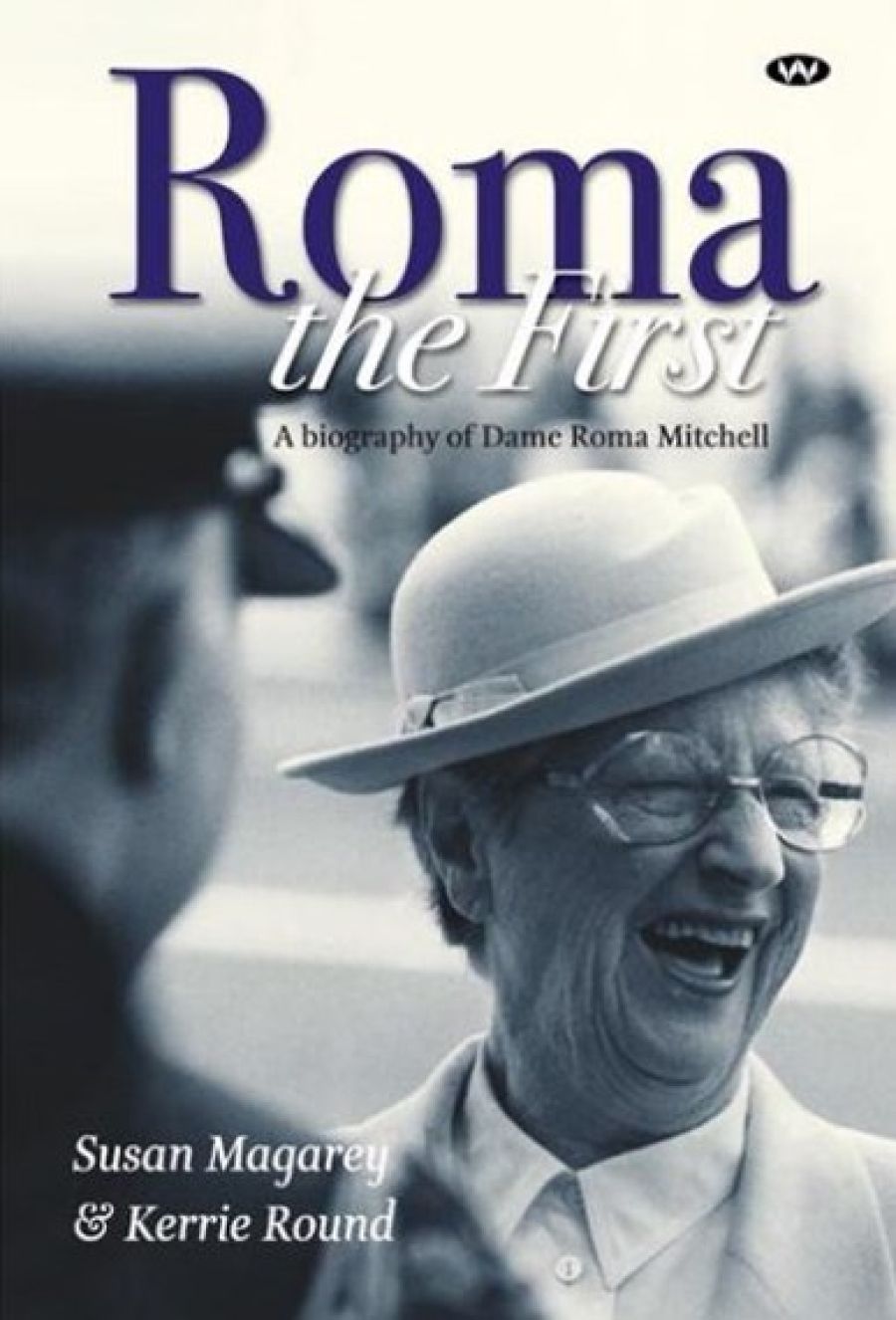
- Free Article: No
- Contents Category: Biography
- Review Article: Yes
- Article Title: Coming first
- Online Only: No
- Custom Highlight Text:
Roma Mitchell came first in nearly everything. Not only at school and university, but in becoming Australia’s first female OC, Supreme Court judge, Boyer Lecturer, university chancellor and state governor. But she had no inside track to success. Her father was killed in World War I, her mother survived on his pension and the generosity of friends, and Roma and her older sister were taught by the Sisters of Mercy for nothing.
- Book 1 Title: Roma the First
- Book 1 Subtitle: A biography of Dame Roma Mitchell
- Book 1 Biblio: Wakefield Press, $39.95 pb, 465 pp
- Book 1 Cover Small (400 x 600):

- Book 1 Cover (800 x 1200):

The Old Adelaide Families (OAFs) clung to their privileges for longer than they deserved them. Roma got under, around and over them with her own combination of conservatism and reform, propriety and daring, restraint and outspokenness, generosity, and ambition. She risked alienating conservatives and progressives alike, but with Adelaide decency, they rewarded her.
This is a very South Australian story, replete with local names, photographs, atmosphere, and intimate detail. The authors, both Adelaide graduates, took six years to research and write it, drawing on the copious Roma archive, and on records kept by the judge herself, including her scrapbooks. They trace her footprints through decades of social change, wars, depression, prosperity, recession, and revival. Yet at the turn of the twenty-first century, the remnants of Adelaide's stuffy, secretive attitudes and its creepy crimes still lurk between the city’s toes, like tinea.
There are surprises, even for locals and ex-Adelaideans. Roma as an undergraduate applied to External Affairs in 1934 ‘for the diplomatic corps’, the authors say, and was refused because she was a woman. I learnt from them why Phyllis Whyte suddenly stopped teaching English at Wilderness. I had forgotten that in 1969 women still couldn’t get mortgages without a male guarantor. When Justice Roma Mitchell wanted to buy her first house, she paid for it in cash.
There are rumours, too. Was Don Dunstan the unacknowledged son of barrister and theatre producer Patricia Hacket? Did Roma have an affair with a married man, that ended abruptly when his wife found out? There are ribald rhymes as well, and jokes. When she became governor, a telegram from the attorney-general’s office asked ‘How old Roma Mitchell?’ To which someone (maybe she) replies, ‘Old Roma Mitchell very well. How you?’
All beholders will have their preferences about local colour and how much of it is a good thing. For foodies, the menus from some meals Roma ate are reproduced here in full. For fashionistas, her clothes for some occasions are described in petit point detail, and three-quarters of a page is given over to a single-column list of what she planned to wear while abroad. For academics, a controversy involving one of the authors is recorded in detail that they don’t lavish on other university crises – the Rowe vice-chancellorship of 1948-58, for instance.
Such a comprehensive account is bound to have gaps. In the 1960s women couldn’t drink in pubs, but Roma's friend John Bray worked until 6.30 pm and then ‘Off to the Sturt Arcade Hotel, it was’. Was Bray not subject to six o'clock closing then? Roma was angry with journalist Peter Ward for implicating Bray in his evidence and reporting on the Salisbury Royal Commission that Roma headed in 1978. But why, if Bray cared, did he make Ward his literary executor?
There is detail about Max Harris, Rosemary Wighton and early Writers' Week, but nothing on Geoffrey or Ninette Dutton. Lieutenant Governor Basil Hetzel, whom the authors acknowledge, and his accomplished wife, were Roma's close friends, but Anne's name appears only once, is misspelled, and isn't in the index. ‘Edna Everidge’ gets similar treatment. My cousin, Robert Woolcock, who succeeded his mother Dulcie in ‘dressing’ Roma for years, appears twice in the text as 'Mr Woolcock', but not in the index. Sesca Zelling, Colin Moodie and External Affairs aren't indexed either.
‘Did it matter? Yes it did.’ Quibbles? Yes, of course! You see, I have been infected by the verbless exclamatory style that Susan Magarey and Kerry Round occasionally adopt. No doubt they set out to write lively, non-legalistic biography, and they succeeded. Yet the occasional passages in italics puzzle me: do italics indicate editorialising, or hindsight or speculation? They don’t explain.
But Roma, looking down (she died in 2000), will enjoy this book, and will be pleased to read that her example ‘shines like a good deed in a naughty world’.


Comments powered by CComment